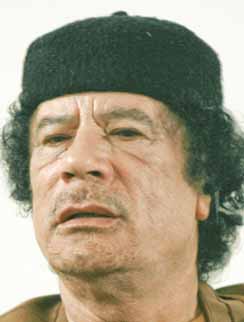Risky mission

ASSOCIATED PRESS
Libya's Moammar Gadhafi talks during a debate on the sidelines of celebrations marking the 30-year anniversary of the declaration of the "jamahiriya," or "rule of the masses, in Sabha, Libya Friday, March 2, 2007. Gadhafi said in an unusual debate Friday it was time for his long-isolated nation to open up to the world and that one day it won't need him as leader. Still, he touted the ruling ideology he has entrenched here for three decades as superior to Western democracy.
Don’t expect a quick ending for Gadhafi
Associated Press
WASHINGTON
Don’t expect a quick ending in Libya.
There’s a real possibility that Moammar Gadhafi could stave off the U.S. and its international partners, clinging to power in a drawn-out and increasingly dangerous standoff.
Confusion among allies over their goals and who’s leading the mission is complicating the matter.
Gadhafi has a long history of digging in and enduring, after all. He’s held power in the north African country for 42 years and survived U.S. air strikes in 1986 against his compound in Tripoli.
This time, narrowly limited objectives for the allied mission, including assertions by President Barack Obama that Gadhafi himself isn’t being targeted militarily, may encourage him to hunker down in the capital city, surrounded by his followers and militiamen, and try to outwait and outmaneuver the West.
“We are preparing for a long and glorious war,” Gadhafi declared in a radio address Sunday.
In the first war that he didn’t inherit from predecessor George W. Bush, Obama has made a strong point of insisting that regime change is not his military goal — and that the U.S. is just one of many international partners.
Obama still reiterates that Gadhafi must go, but he stops short of saying just how that might happen, talking in broad terms of tools besides military action that the international community has to achieve the goal, including sanctions and the freezing of overseas assets.
The dangers of the military effort were driven home Tuesday with the crash of an American fighter jet, although it was due to mechanical failure and was in territory held by friendly rebels. Both crew members were rescued.
Also on Tuesday, the on-scene commander of the international coalition said civilians were under attack by Gadhafi’s forces in Misrata, Libya’s third-largest city and one Obama has insisted Gadhafi must vacate. U.S. Navy Adm. Samuel J. Locklear told Pentagon reporters the coalition was “considering all options” in light of the attacks, but he didn’t elaborate.
The airstrikes and other military actions have cut off Gadhafi from the oil-rich eastern parts of his country that have been under rebel control. But Gadhafi, controlling much of the western part of the country including its capital of Tripoli, clearly isn’t about to throw in the towel.
Obama’s policy — put into effect after Defense Secretary Robert Gates publicly cautioned that bombing to establish a no-fly zone was basically an act of war — is generating growing worries and criticism on Capitol Hill from members of both parties.
Even some Democrats and GOP moderates who generally support Obama on military issues are raising concerns that Libya — whose terrain resembles that of Iraq but which is four times as large — could become a military quagmire.
Sen. Richard Lugar, R-Ind., senior Republican on the Senate Foreign Relations Committee, warned of becoming ensnarled “in a situation in which war lingers on, in country after country” across the region.
Sen. James Webb, D-Va., a former Navy secretary, said Obama and his administration have “a very clear obligation now to come forward to the American people and to the Congress and state clearly what they believe the end point of this should be.”
The beginning phase is murky enough, as allies argue among themselves over who should lead the mission and what the ultimate goals are.
“The fact is, day by day, we’re going to confront the reality that a no-fly zone is probably a misnomer,” said Anthony Cordesman, a national- security analyst at the Center for Strategic and International Studies. “If this structure can’t stop Gadhafi’s ground forces, then it fails.”
 43
43
